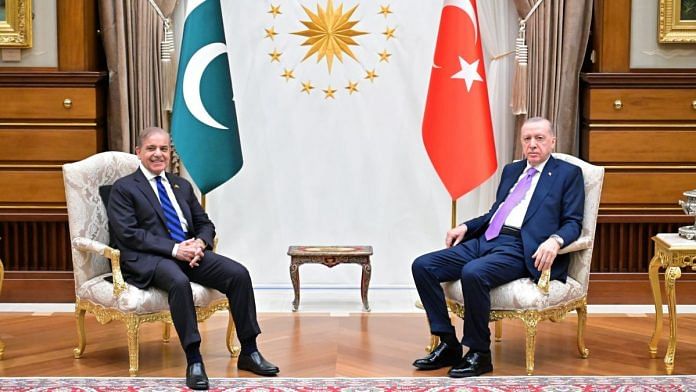India’s military is preparing a suitable retaliatory strategy in response to this barbaric assault. In parallel, several non-kinetic, strategic steps have already been taken. However, these actions represent only the beginning—the visible surface of a much deeper and more complex challenge that lies beneath.
The question carries several layers, but the most immediate and clear answer—especially when it comes to military capabilities—is China, followed closely by Turkey.
Prime Minister Narendra Modi’s assertive stance, which calls for holding not just Pakistan but also its backers accountable, will have to address the growing involvement of both China and Turkey in strengthening Pakistan’s military apparatus. Any comprehensive response must confront the strategic advantage China enjoys through its military foothold near India, particularly in regions like the Shaksgam Valley. The valley was originally under Pakistan’s control but was ceded to China decades ago, allowing Beijing to exert additional pressure on India.
Contrary to the commonly held view that China simply filled the void left by the United States after it distanced itself from Pakistan in the 1990s, the ties between Beijing and Islamabad run much deeper. Their collaboration, especially in defence, dates back to the Cold War era. When the US and its Western allies eventually severed military support to Pakistan, China had already begun establishing itself as Islamabad’s primary strategic partner—a role it continues to expand. In recent years, Turkey has also stepped into this role, further reinforcing Pakistan’s military ambitions. Complicating matters for India is the current situation in Bangladesh, again to China and Turkey’s advantage.
To understand the depth of China’s involvement in Pakistan’s defence setup, one must look back at a by Tim Weiner in The New York Times. The piece shed light on China’s crucial role in helping Pakistan develop nuclear weapons. While the US initially facilitated training and turned a blind eye to Pakistan’s nuclear ambitions during the Cold War, it was China that provided the actual blueprint for nuclear weapons. It also supplied Pakistan with enriched uranium, tritium, experienced scientists, and other essential components for building a functioning nuclear arsenal. Without China’s direct intervention and material support, Pakistan’s nuclear programme likely wouldn’t exist.
Confirmation of China’s involvement had come earlier, in 1983, when a classified report by the US State Department was made public. It clearly stated that China had provided direct assistance to Pakistan’s nuclear programme. This revelation came before Washington imposed sanctions and ceased aid to Islamabad—a turning point that marked the end of Pakistan’s strategic utility for the US. These records are now accessible in the US National Security Archives, offering a well-documented trail of China’s support for Pakistan’s nuclear and military growth.
That, however, is history.
In the post-Cold War era, China has emerged as the leading defence supplier to two of India’s most challenging neighbours—long-standing adversary Pakistan and increasingly unfriendly Bangladesh. According to data from the Stockholm International Peace Research Institute (SIPRI), from 2019 to 2023, China exported weapons to nearly 40 countries. What’s concerning for India is that over of these exports were directed solely to Pakistan. With Western nations gradually withdrawing from arms deals with Islamabad, Pakistan has grown heavily reliant on Beijing to meet its defence requirements.
From 2009 to 2013, 51 per cent of Pakistan’s military imports came from China. This figure increased to 69 per cent in the following five years, and between 2019 and 2023, it surged to a staggering 82 per cent. Beyond standard arms sales, China has also helped Pakistan develop key defence projects, including the JF-17 fighter jet. Additionally, Islamabad is preparing to add eight Chinese Yuan-class submarines to its navy, significantly enhancing its maritime power.
China’s influence isn’t limited to Pakistan. It has also become the main defence supplier to Bangladesh, particularly following the political shift in Dhaka after Sheikh Hasina’s ouster in August 2024. The defence relationship between China and Bangladesh has deepened over the years, anchored by a comprehensive defence cooperation agreement signed in 2002—Bangladesh’s first such pact with any nation. Over 72 per cent of Bangladesh’s weapons came from China, and in just the past two years, this reliance has jumped to .
China’s military exports to both countries include high-value naval assets like submarines and frigates, which are critical to modernising their respective naval forces. Moreover, China is actively engaging in joint exercises, such as the ‘China-Bangladesh Golden Friendship 2024’ military drill. While such initiatives may seem routine, they reflect a broader strategic alignment that is developing just as India’s own diplomatic ties with Bangladesh appear to be weakening.
Despite maintaining a public image of improving ties with India, China is covertly strengthening both of India’s flanks through advanced military support. This two-pronged approach is raising the strategic pressure on India while fostering an emerging Pakistan-Bangladesh alignment, which, if left unchecked, could significantly challenge India’s regional security architecture.
If China was the only country supplying arms to India’s adversaries, the situation might have been less alarming—largely because Chinese-made weapons are often plagued with quality and reliability issues. Even in recent shipments as of 2021, including trainer aircraft and naval frigates, performance deficiencies have been widely reported. The much-hyped Ming-class submarines, offered at steep discounts, also failed to meet operational standards. Several have since been delayed or placed on hold due to these shortcomings.
However, another serious concern has emerged for India: Turkey’s expanding footprint in the region. This has become especially evident following Turkey’s launch of its ‘Asia Anew Initiative’, which aims to strengthen ties with Islamic nations across the continent, including those in India’s immediate neighbourhood.
Take Pakistan, for instance. After Western nations ceased their weapons exports to Islamabad, Turkey became the only other significant supplier besides China. While China was already arming Pakistan extensively, Turkey stepped in to further bolster its defence capabilities.
What’s more troubling is that Turkey has the sale of military equipment to India. This policy, which had not been officially announced, came to light unintentionally during a Foreign Affairs Committee meeting on 10 July 2024. During the session, Mustafa Murat Seker, deputy head of Turkey’s top arms procurement body, the Presidency of Defence Industries (SSB), disclosed that Turkey had quietly enforced this restriction on India.
Unlike Chinese weapons, which are not battle-tested, Turkish arms are modern, combat-proven, and highly advanced. They have been effectively deployed in various recent conflicts, including the Armenia-Azerbaijan war and the ongoing Russia-Ukraine war, making them far more credible and effective.
Like China, Turkey’s involvement also goes beyond conventional arms sales. Similar to China’s playbook of manipulating information, Turkey has been covertly helping Pakistan build a sophisticated . This cyber unit is reportedly tasked with shaping narratives, influencing Muslim communities in Southeast Asia, conducting on the US and India, and shielding Pakistan’s leadership from international criticism. These operations are believed to have been underway since at least 2022.
Turkey’s influence is also growing in Bangladesh. In 2022—the year Dhaka signed a defence cooperation agreement with China—it also entered into a similar pact with Turkey. This parallel deepening of ties with both Beijing and Ankara underscores a strategic shift in Bangladesh’s foreign policy posture.
While arms producers naturally seek markets for their products, what sets China and Turkey apart is the coordinated and aggressive nature of their support to India’s regional adversaries. The fact that they are not just selling weapons but also actively working to influence public opinion, destabilise India’s digital domain, and challenge its regional standing makes their actions a significant and evolving threat to India’s national security.
For a long-term strategy on Pakistan to work, India has to keep its guard up on the dirty games played by its backers and enablers.
(Edited by Prasanna Bachchhav)







